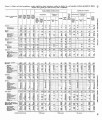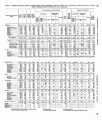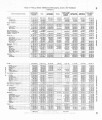| OCR Text |
Show COMMISSIONER OF INDIAN ~ F A I R S . 15 schools, with their graduates, contributed last year teachers, carpen-ters, farmers, housekeepers, etc.; the automobile factories sent out skilled Indian mechanics, and each year a nulqber of Indians haqe been placed in factories fpr such traming. Indians are on the stage and in the professions doing well. With productivit at a low ebb abroad and high prices at home, the problem of emp9, o yment presses for solution, and it has been nec-essary in some localities to exert extraordinary effort to find work for Indians. Because the Indian is gradually becoming a literate race he is fitting in wherever work is available. FIVE CIVILIZED TRIBES. Substantial progress was made during the year in winding up tribal affairs. In the Creek Nation all allotments have been com-pleted and members have been paid their pro rata, shares of tribal funds, the unfinished buslness of that nation involving only the dis-osition of approximately $244,000 worth of tribal property. In [he Seminole Nation allotment work has been completed, members have been paid their ro rata shares of tribal moneys, and only $25,100 worth of triba f property remains to be disposed of. The Cherokee tribal affairs have heretofpre been entirely closed. The largeat and most valuable tnbal property yet to be dis osed of is the se egated coal and asphalt.minera1 deposits in the 8hoc-taw and ~Kckasaw Nations, of which 424 tracts remain unsold, which embrace an area of 379984.46 acres. Owing to unsettled financial conditions, the unsold coal and asphalt minerals in the Choctaw and Chickasaw Nations were not offered for sale during the year. There also remains unsold 2,330 town lots. There are 34,182 acres of land in the Choctaw and Chickasaw Na-tions reserved by coal and asphalt lessees for mining,purposes sub-ject to lease by the Government for the benefit of said nat~onse, x-cept such portions thereof as are actual1 required by said lessees for mining purposes. During the year t i: ere has been collected as rental on this property a total of $17,740.86. The important remaining work relates to the individual affairs of some 18,500, known as the restricted class, or those having one-half or more Indian blood, from all of whose land restrictions have not been removed.. In less than, 10 years the restricted period as applied under existing law will expire. This should be a penod of construc-tive effort as regards the education of children of school age, the determination of those actually competent to manage their affairs, the wise conservation of lands and funds of those remaining under restrictions, the sale or leasing of their lands and the careful dis- ) bursement of proceeds for improvement of homes and equipment to promote self-support, and the fullest encouragement toward self-reliance and industrial efficiency, if the extension of the trust period in a very large number of cases i~ 5 be avoided. The cashier for the Five Civilized Tribes handled a total of $19,853,181.54, including receipts and disbursements of all classes of funds. Indian money belonging to individual Indians amounting to $2,797,951.01 was expended for their maintenance, f a ~ sb,u ildings, live stock, and equipment. There was credited to indiv~duaIl ndian accounts the sum of $6,990,738.25. |









































































